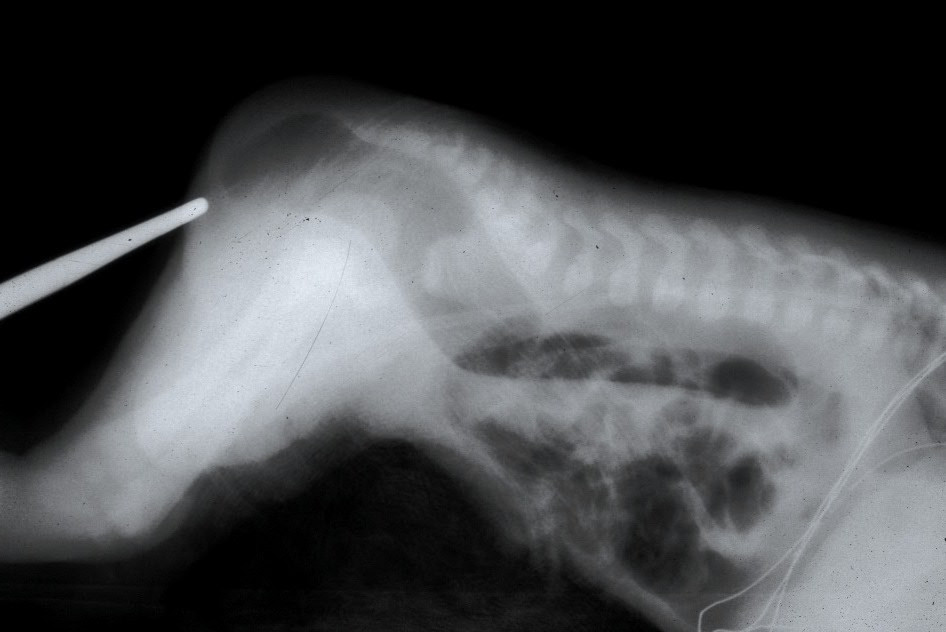Currarino syndrome
Editor-In-Chief: Prab R Tumpati, MD
Obesity, Sleep & Internal medicine
Founder, WikiMD Wellnesspedia &
W8MD medical weight loss NYC and sleep center NYC
| Currarino syndrome | |
|---|---|

| |
| Synonyms | Currarino triad |
| Pronounce | N/A |
| Specialty | N/A |
| Symptoms | Sacral agenesis, anorectal malformation, presacral mass |
| Complications | Constipation, urinary tract infections, neurological deficits |
| Onset | Congenital |
| Duration | Lifelong |
| Types | N/A |
| Causes | Genetic mutation in the MNX1 gene |
| Risks | Family history of the condition |
| Diagnosis | MRI, CT scan, genetic testing |
| Differential diagnosis | Caudal regression syndrome, sacrococcygeal teratoma |
| Prevention | N/A |
| Treatment | Surgical intervention, bowel management |
| Medication | Laxatives, antibiotics |
| Prognosis | N/A |
| Frequency | Rare |
| Deaths | Rarely fatal |
Currarino syndrome is a rare congenital disorder characterized by a triad of anomalies including a sacral defect, anorectal malformation, and a presacral mass. It is named after Guido Currarino, an Italian-American radiologist who first described the syndrome in 1981. The syndrome is caused by mutations in the HLXB9 gene and is inherited in an autosomal dominant manner.
Signs and Symptoms[edit | edit source]
The clinical presentation of Currarino syndrome can vary widely, even among members of the same family. The classic triad of symptoms includes:
- Sacral defect: This is usually a partial agenesis (absence) of the sacrum, the large, triangular bone at the base of the spine. The defect can often be seen on an X-ray.
- Anorectal malformation: This can range from a minor anal stenosis (narrowing) to a complete absence of the rectum and anus. These malformations can lead to severe constipation and fecal incontinence.
- Presacral mass: This can be a benign growth such as a teratoma or an anterior meningocele, or a malignant tumor such as a chordoma.
Other symptoms can include urinary tract anomalies, gynecological abnormalities in females, and spinal abnormalities.
Diagnosis[edit | edit source]
The diagnosis of Currarino syndrome is based on the clinical features and imaging studies, such as X-rays, ultrasound, CT scan, or MRI. Genetic testing can confirm the diagnosis by identifying a mutation in the HLXB9 gene.
Treatment[edit | edit source]
The treatment of Currarino syndrome depends on the symptoms and their severity. Surgical intervention may be required to correct anorectal malformations and to remove presacral masses. Long-term management may include treatment for constipation and urinary incontinence.
Prognosis[edit | edit source]
The prognosis for individuals with Currarino syndrome varies depending on the severity of the symptoms and the presence of any associated conditions. With appropriate treatment, most individuals with Currarino syndrome can lead a normal life.
See Also[edit | edit source]
References[edit | edit source]
Search WikiMD
Ad.Tired of being Overweight? Try W8MD's physician weight loss program.
Semaglutide (Ozempic / Wegovy and Tirzepatide (Mounjaro / Zepbound) available.
Advertise on WikiMD
|
WikiMD's Wellness Encyclopedia |
| Let Food Be Thy Medicine Medicine Thy Food - Hippocrates |
Translate this page: - East Asian
中文,
日本,
한국어,
South Asian
हिन्दी,
தமிழ்,
తెలుగు,
Urdu,
ಕನ್ನಡ,
Southeast Asian
Indonesian,
Vietnamese,
Thai,
မြန်မာဘာသာ,
বাংলা
European
español,
Deutsch,
français,
Greek,
português do Brasil,
polski,
română,
русский,
Nederlands,
norsk,
svenska,
suomi,
Italian
Middle Eastern & African
عربى,
Turkish,
Persian,
Hebrew,
Afrikaans,
isiZulu,
Kiswahili,
Other
Bulgarian,
Hungarian,
Czech,
Swedish,
മലയാളം,
मराठी,
ਪੰਜਾਬੀ,
ગુજરાતી,
Portuguese,
Ukrainian
Medical Disclaimer: WikiMD is not a substitute for professional medical advice. The information on WikiMD is provided as an information resource only, may be incorrect, outdated or misleading, and is not to be used or relied on for any diagnostic or treatment purposes. Please consult your health care provider before making any healthcare decisions or for guidance about a specific medical condition. WikiMD expressly disclaims responsibility, and shall have no liability, for any damages, loss, injury, or liability whatsoever suffered as a result of your reliance on the information contained in this site. By visiting this site you agree to the foregoing terms and conditions, which may from time to time be changed or supplemented by WikiMD. If you do not agree to the foregoing terms and conditions, you should not enter or use this site. See full disclaimer.
Credits:Most images are courtesy of Wikimedia commons, and templates, categories Wikipedia, licensed under CC BY SA or similar.
Contributors: Prab R. Tumpati, MD


